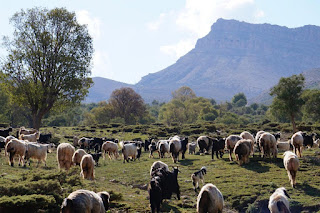Nomadic Lifestyle
A nomadic lifestyle entails frequent movement to various locations without settling down or residing there permanently.
Explore the places where families of nomads have been widespread for ages by looking into the definition and description of a nomadic lifestyle.
Who are the Nomads?
In today's America, many things are taken for granted. Most Americans return to the same area at the end of each day, whether it be a studio apartment or a mansion.
But this isn't true for everyone on the planet today, and it wasn't true for our earliest ancestors either.
There are still tribes that live as nomads, like our ancestors did, on the Eurasian steppe, Africa, and even Europe.
The oldest type of human culture that is still in existence today is probably nomadic. Nomads are typically individuals or tribes who do not view themselves as being anchored to a particular piece of territory.
Living the Nomadic Lifestyle
Being a nomad offers some great benefits and some serious drawbacks, just like everything else in life.
We'll go over some of the primary aspects of the nomadic lifestyle in this essay. But first, let's have a brief talk about the state and present developments of the nomadic way of life.
Technology, which has two connected effects, is the one main component that has an impact on nomads.
On the one hand, while technology gives individuals more incentive to settle down, it is reducing the population of the ancient nomadic tribes.
The internet, on the other hand, makes it possible for people to work from home and adopt the lifestyle of a digital nomad.
which gives anyone the freedom to work remotely while enjoying the flexibility of frequently changing locales.
Characteristics of Nomadic Lifestyle
Mental Adjustments to Develop a Nomadic Way of Life
1. Pay Attention to Emotions Signals
Traveling will bring everything to the surface since with every high comes a low. Traveling may be exhausting, intimidating, and highly uncertain.
you learn to adapt to the situation and manage your expectations when things don't go as expected or you experience disappointment.
To truly feel what you are going through and get through it. You must be comfortable with the complete spectrum of emotions.
2. Have Faith in What's Attainable
To develop a nomadic lifestyle you love, it is imperative that you have faith in your own abilities.
You must be completely aware that switching to this way of life demands a lot of guts and trust if you wish to be a digital nomad.
Write down your intentions, make a plan for your dreams and goals, imagine the reality you desire for yourself, and then take concrete measures in that direction.
Always looks at the bright side. Challenges are frequently the best opportunity for self-discovery.
Remember the times in your life when you were able to draw amazing changes into your life. They typically occurred while you were in a calm, flow-state.
and use those memories to reassure your logical mind that it can and will happen once more.
Enjoy it after you make the first great leap of faith. There will inevitably be difficult times, and practicing joy will help you get through them.
Don't allow prejudice to stand in the way of your transition to a nomadic existence. When you initially start out, friends and relatives will find it simple to discredit and doubt your goals.
Because of popular culture. In order to maintain your commitment to your objectives and vision. It is crucial.
And, is imperative that you learn how to handle criticism of your choice to lead a nomadic existence.
3. Accept Spontaneity
Even though the interim period is unsettling and frightening and you are susceptible to being swept away by the brittle currents of fear and constrained thinking.
4. Develop an Attitude of Gratitude
READ ALSO:
Frequently Asked Questions
The solution to the question "how to be a nomad" is actually quite simple. Determine how much cash you'll require each month.
To be able to visit the places you want to go and live there. Find remote employment that enables you to work from any location. That's basically it.
Freedom.
The independence that comes with a nomadic existence is undoubtedly its most appealing quality.
It's daunting to consider all the options for where you can go and what you can do, but I believe this is a good thing. Actually, the world is your oyster.
3. What Do Nomads Do?
A nomad is a person without a permanent residence who travels from one location to another in search of food, pasture for their animals, or other means of subsistence.
Most nomadic groups travel and settle according to a set annual or seasonal cycle. Traditionally, nomads have traveled by canoe, animal, or foot.
4. Why is Nomadic Life Difficult?
They go about with themselves. They construct ad hoc homes rather than living in permanent settlements.
Due to their scarce resources and other severe issues in their environment, nomads have an extremely difficult time surviving.
What is Nomadic Culture?
Nomadism, is a manner of life in which people travel around seasonally or irregularly rather than living permanently in one area.
It differs from migration, which is noncyclical and necessitates a complete change of habitat.
Each of us should individually tailor our own nomadic lifestyle, given the wide variety available. For instance, you can create a set of norms and routines for your nomadic lifestyle.
That you can follow and modify over time. Now it's up to you to decide if living a nomadic lifestyle is a worthwhile experiment for you, and if so, simply go for it.
We hope this was a great read. Let us know your thoughts and suggestions in the comment. Feel free to share with loved ones and active media accounts.







